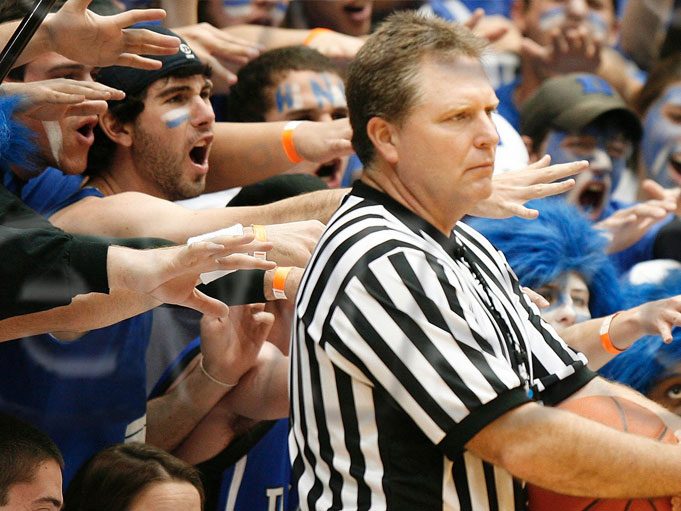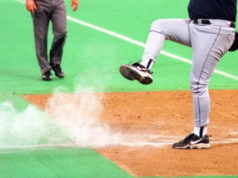Sadly, personal safety is a concern for officials today. What’s being done to ensure game security and our welfare?
John Locke, the 17th century English philosopher and physician said, “All mankind … being all equal and independent, no one ought to harm another in his life, health, liberty or possessions.”
Four hundred years later, Locke would likely be appalled by what’s happening at athletic venues in the U.S. and abroad. Officials — the symbols of law and order in our games — are being abused, assaulted and even killed.
Recognizing the lack of civility and the need for officials to be secure in those surroundings, NASO dedicated a session at a recent Summit to security for game officials.
Joan Powell, the NCAA’s national coordinator of volleyball officiating, and Mark Uyl, director of officials for the Michigan High School Athletic Association, served as lead panelists for the session. Dan Olson, NASO Director of Audience Development, was the moderator.
Administrative Involvement
What steps can be taken not only before the action begins, but before the officials arrive? Not necessarily for safety or security reasons, but as a best practice?
Uyl said administrators should have the officials’ contact information — home, work and cell phone numbers in particular.
“If you’re in the assigning business, it’s making sure the schools have who’s working and their cell phone number just in case anything goes sideways,” Uyl said. “It just eliminates so many other issues.”
Uyl, an NCAA Division I baseball umpire who worked the 2014 College World Series, noted that’s a two-way street. Officials should know whom to call if there is an issue. “If I’m going to work that game, I know who my (contact) person is going to be. A lot of times it isn’t the school athletic director. It may be a game manager, an event manager. Know who that one go-to person is throughout the entire night, the entire day, the entire tournament, so you know exactly if you need help where that help can come from,” he said.
In her coaching days, Powell worked for an athletic director who reached out to the student body for assistance. He identified leaders among the students and formed a sort of game management club that would serve as support staff. “Let’s say there was a basketball game,” Powell recalled. “They were identified in their event staff shirts. They would escort grandma and grandpa into the stands so they were safe. At the end of the game they would go along the sideline and protect athletes and also referees. Referees were escorted out, and the athletes then were not barraged by a boatload of fans coming on to the court as they won the game.”
That struck a chord with audience member Joel Oswald, assistant director of the Iowa Girls High School Athletic Union (IGHSAU). “We have one school in particular, Oskaloosa High School, that has an ambassador program,” Oswald said. “The volunteers at that school indicate an interest in officiating as well as helping with security and crowd control.
“We have taken it a step further beyond using it as a model,” Oswald said. “We’ve tried to use that as a recruitment tool. We just put those guidelines together and send them out to our high schools. We’ve actually invited (Oskaloosa program participants) to our state tournament, so during our state basketball tournament we’ve had those kids be the ones to provide the towels, escort the officials, etc.”
Powell noted the importance of developing an “exit plan” as well as knowing where the game manager can be found if problems arise during the contest. “At the high school level, (it might not be the) athletic director. It might be a counselor, it might be just some teacher that’s involved with event management for that contest,” she said. “So it does go back to the (home team’s) head coach if there’s no event manager there.”
Safe And Secure
Audience member Josh Berka, a member of the Iowa City Athletic Officials Association who works at the University of Iowa in event management, said too many game administrators at the lower levels have a dismissive attitude when it comes to those working their games.
”I think a lot of times there’s kind of that separation: ‘Oh, it’s just the officials,’” Berka said. “No, it’s not ‘just the officials.’ We’re all in this together. It’s about building that rapport. It’s developing that relationship to the point where, if there’s an issue at a contest, they feel comfortable going (to the game administrator for help), then they go back to doing the job that they’re supposed to be doing.
“At the high school level, obviously it’s making sure that athletic directors know, ‘Hey, you’ve got to have somebody there,’” Berka continued. “You’ve got to have somebody that is not only just responsible for your contest, but responsible for the officials.
“It may not get to the point (how things are done) at Iowa, where it’s like welcoming guests to our house, whether it’s officials, coaches, teams or fans. But still, having that sort of relationship is really key,” he added.
Host venues need to have screening plans in place to ensure that only authorized personnel are allowed in areas of the game site where officials are located. Uyl noted that security at TD Ameritrade Park in Omaha, Neb., where he worked the College World Series, was extremely tight. “It was like Fort Knox to get into the lower level,” he said. “You had to have a credential to get to the locker room areas where teams and officials could go. Things were very much locked down.”
Another consideration is field or court access for the officials. A route that keeps officials separate from fans and teams has multiple benefits, Uyl noted.
Being Invisible
It’s not uncommon for officials to arrive at assignments wearing all or parts of their uniforms. “I was a high school athletic director, and we commonly had soccer officials, volleyball officials, even some lower level basketball officials that would show up fully dressed to work a game, figuring they would get in and out,” Uyl said. “That’s a real security risk, not so much before the game, but after. You have a situation, you have a problem, the game ends, it’s two minutes after the game, there are still fans and spectators milling around. And now you’re heading out through the public areas in your uniform, which can just become a lightning rod for other issues and problems.”
Uyl said officials need to take advantage of perks offered, such as secure locker rooms. “One fall we had some issues in soccer,” he recalled. “So I was going to provide a safe locker room for all of our soccer officials. Expect them to get there ahead of time, a place to go, a place to sit down, we’d have something for them to drink, something to eat. Afterward, (they could) come into the locker room, let the crowds clear. Of the 15 home games we had that soccer season, (two) crews took us up on that. If schools are going to provide some of those things, (game administrators should) demand that folks use it.”
Conversely, officials should avoid parking spaces designated for officials only. “Try and find a place where there’s dedicated parking, but not one that’s broadcasting exactly who you are and what you’re there for,” Uyl suggested.
More Parking Lot Problems
Powell recalled a parking lot situation from her days umpiring men’s softball. The idea of women working men’s games was still foreign to many, particularly Neanderthal types viewing the women as interlopers.
“When I got to the park, a gentleman and I worked the games. There were two games. Uneventful, we separated, walked our way and I went to my car,” she said. “By that time, the losing team had already gotten their beverages out of their coolers, and I noticed as I put my equipment away that my car was blocked in. What were my options here? Call a cab? Call the police?
“It’s 10 at night,” Powell continued. “I thought about going across the street and knocking on a door, and I thought maybe that wasn’t good. So I got into my car. Well, now they know whose car it is, but I thought, being pretty naive, that somebody either in front of me or behind me is going to move their car. I was very frightened.
“No one ever said go to a lighted area, maybe go with your partner, park at the strip mall down the way, make sure that you both get to your cars safely,” she said. “I had to wait and wait and wait until finally one guy finished his beer and he pulled out of the parking spot. But they were there to teach me a lesson, I guess, that I didn’t belong in their game. I had no recourse. There was no cell phone. It was a frightening situation.”
Officials have to be smart when it comes to their conduct away from the venue as well. It’s not uncommon for officials to patronize establishments in and around the towns where they work. “People know who you are, why you’re in town,” Uyl said. “When you go out for dinner and want to have a couple of drinks, you have to be very cognizant of your surroundings. You’re seen by the wrong people, the wrong fans. You’re now working that game 1:00 the next day, something happens and now suddenly what’s all over social media? You can just see where that can go. It is really more of how you handle yourselves off the field.”
The lack of private facilities can pose other challenges for officials. Uyl related the story of a baseball umpire who, due to lack of a locker room and following established custom, was stripped down to his running shorts and began to don his plate gear. Problem was the lot abutted an elementary school. “One of the parents picking up their second grader over at the elementary school grabs her cell phone and calls the police,” Uyl said. “The story to the police is, ‘We have someone who’s naked in the school parking lot as kids are being released from school.’”
The umpire, who Uyl acknowledged didn’t handle the situation well, was charged with indecent exposure.
“Where you park, the way you handle yourself in that situation, that’s another good reason why you try and ask and move yourself inside. Get into a locker room, get out of the parking lot,” Uyl said.
How Not To Deal With Fans
The issue of obnoxious fans was raised. How do you handle the leather-lunged spectator who is chirping non-stop? Uyl and Powell each had a story that comes under the “Wouldn’t you love to do that?” category, but also comes with a strong warning not to emulate the officials involved.
A fan at a daylong wrestling tournament is constantly berating the officials. During a match in the championship round, the wrestlers go out of bounds and the fan again voices his displeasure with the officiating.
“The official gets the kids ready on the mat and says, ‘Wait right here,’” Uyl related. “The official leaves the mat, goes up the eight rows, into the crowd, down the row, right next to the dad, blows his whistle and says (to the competitors), ‘Wrestle.’ He turns to the dad next to him and says, ‘Apparently I can see everything I need to right next to you.’”
Although it was a Saturday, Uyl said someone called that night to report the official’s conduct. “I called the official first thing Monday morning. I said, ‘On the record, you can never do that again.’ I said, ‘Off the record, I want to shake your hand because what you did is something that anyone who has ever officiated … it’s at least gone through our mind once.’”
Powell’s story was virtually identical, except the venue was a volleyball tournament in Colorado. “The referee brings both captains together, explains something to them, dismisses them, beckons for serve, gets off the stand, and sits right next to a dad,” she said. “Play is going on. He blows his whistle, kills the ball, turns to the parent and says, ‘You are absolutely right. I can call a better game from right here.’”
The preferred method, Powell and Uyl agreed, is to let others deal directly with problem spectators.
“During a game I think there needs to be those very clear boundaries that spectators and others can never come onto the competition area,” Uyl said.
“No matter what happens, officials need to respect that same barrier going the other direction. That’s just a line we cannot cross. Never engage fans. If it gets bad enough, stop the game, go find game management and have the person removed. But never try and address a fan or try and make a point to a fan.”
Exit Strategy
What’s the best way to leave the playing surface once the game is over? Although some rule codes — soccer’s Laws of the Game in particular — require officials to stay and observe the postgame handshake, in most sports the best policy is to leave immediately. Don’t wait for compliments. Don’t acknowledge requests for information.
The reason, Uyl said, is that an inquiry will as often as not turn out to be criticism veiled as a question. “You will never flip (their opinion) in that 10- to 15-second exchange,” Uyl said. “Never ever, ever. The answer that you give will not have that person that probably just lost saying, ‘Oh, I’m completely on your side now.’ It just is never going to happen.”
Leaving the venue as a group was also stressed. “Don’t let the first person to the gate or the door leave first,” Uyl cautioned. “That leaves your partner or the other two or three behind. Because if something happens, what do you now have? Witnesses.”
Uyl said critical phone calls he receives are less often about rules and mechanics, but most often are complaints regarding officials’ conduct. “It’s always, ‘Mark, you won’t believe what your official said.’ And a lot of times it’s not even during the game,” Uyl continued. “So if that fan or that school wants to now accuse the official of swearing at a fan as they’re getting off the floor, if the two or three partners are with that official, it makes it very easy. If that was not said or this is something that the parent is making up, it’s now very easy to support that official. So strength in numbers, whether that’s during the game, after the game. Stick together as a crew.”
Powell cautioned that even the best-laid plans may have to change if circumstances demand it. Her point was made when Albuquerque volleyball official and Summit attendee Steve Franco spoke up.
“At one of our gyms we have multiple exits that we can use,” Franco said. “It’s been my experience that if the local team happens to be doing extremely poorly, the coach can get very excited. I’ve made suggestions to my partner that, if that coach happens to lose, let’s walk the opposite direction and go out the other exit as opposed to the standard exit we normally use.”
Long Arm Of The Law
When things get nasty and beyond the ability of the game manager, or if laws have been broken, there is no recourse but to call the authorities.
Attendee and ice hockey official Dick Davidson, Eastchester, N.Y., was witness to an ugly incident. “In one particular game, a brawl just escalated to where spectators came on the ice,” he said. “I had rink management call the police.”
But whenever possible, Uyl said, the game manager should be the point person in keeping officials safe. “I think you really need to always start with your game management,” he said. “Then if game management wants to engage and include law enforcement to help you (it’s their call).”
He noted that the mere presence of authorities can give officials a sense of security and safety. “Maybe at the end of the game they meet you at the corner of the court or the field, and their one and only job may be to walk you to your locker room door. I think if, at a minimum, schools would provide that, that would be wonderful,” he said.
Assaults on officials are all too common, but Uyl said it’s unfortunate that sometimes officials overreact to outbursts.
“Let’s say it’s baseball, and the coach makes contact with our umpire, whether that’s a finger in the chest, or it’s a bump, but there’s physical contact,” Uyl said. “We have some officials who want to … file assault charges. And, of course, what does the coach always say happened first? ‘Before I bumped the umpire, the umpire bumped me,’ or, ‘He hit me with the bill of his cap,’ and now it’s back and forth.”
Uyl said those incidents are best handled internally, with the governing body taking first crack at gathering information. “Those gamerelated things, we try and handle those internally under our rules and regulations,” Uyl said. “If you have those things that are really outside of the athletic purview — where someone is grabbed, someone is struck — then certainly I think getting law enforcement involved needs to become a viable option at that point.”
The Paper Chase
One area in which officials fail miserably is in writing reports regarding ejections, misconduct and similar issues.
“I think it’s really sad that we don’t teach our officials how to write a report,” Powell said. “We touch upon it at the NCAA level. Assigners have certain expectations, (one being) make sure that you contact us prior to the coach contacting us. I want to hear it from the officials first. I don’t want to get the phone call from the coach at 10:15 at night. I’d rather hear from you.”
Powell said the importance of clear, concise, accurate reports has ramifications beyond fines and suspensions. “It can come back and haunt you later if this comes to a court situation,” she said.
“The takeaway is just stick to the facts,” Uyl said. “Don’t tell me what you thought the coach was thinking. Don’t tell me that the coach ‘seemed agitated during the entire game.’ Don’t speculate. Just the facts. Who, what, why, when. The very straightforward, here’s what he said, quote, unquote. Include it all, and if that includes profanity, include it. Exactly what was said, exactly what you said.”
Although cursing by officials is not encouraged, Uyl said if an official does use profanity, owning up to it is preferred to hiding it or denying it.
“It’s a lot easier to work through that if the official is honest with you ahead of time than it is for you to head down that path and now you find out later that, no, here’s actually what was said,” Uyl stated. “So factual and accurate — if we can stick to report writing with those two keys in mind, more often than not we can work our way through it.”
The Bottom Line
The bottom line, Powell noted, is knowledge. “Knowing your surroundings and being aware, but also the what ifs,” she said. “It could be anything from weather to an intruder. But it’s very difficult to even surmise where you are each week, every assignment and where you should go and what’s the best way to stay safe”
Ultimately, if we aren’t looking out for our own safety and that of our crewmates, no one will.
What's Your Call? Leave a Comment:
Note: This article is archival in nature. Rules, interpretations, mechanics, philosophies and other information may or may not be correct for the current year.
This article is the copyright of ©Referee Enterprises, Inc., and may not be republished in whole or in part online, in print or in any capacity without expressed written permission from Referee. The article is made available for educational use by individuals.



















